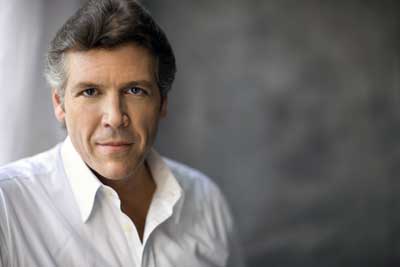バリトン歌手: トーマス・ハンプソン Thomas Hampson
Thomas Walter Hampson (born June 28, 1955) is an American lyric baritone, a classical singer who has appeared world-wide in major opera houses and concert halls and made over 170 musical recordings.

Hampson's operatic repertoire spans a range of more than 80 roles, including the title roles in Mozart's Don Giovanni, Rossini's Guillaume Tell and The Barber of Seville, Ambroise Thomas' Hamlet, and Tchaikovsky's Eugene Onegin. The center of his Verdi repertoire remains Posa in Don Carlo, Germont in La traviata, the title roles in Macbeth and Simon Boccanegra, and more recently also Amfortas in Wagner's Parsifal and Scarpia in Puccini's Tosca.
As a recitalist Hampson has won worldwide recognition for his thoughtfully researched and creatively constructed programs that explore the rich repertoire of song in a wide range of styles, languages, and periods. He is one of the most important interpreters of German Romantic song ? especially known for his interpretations of the music of Gustav Mahler and, with his "Song of America" project collaboration with the Library of Congress, has become known as the "ambassador" of American song.
Hampson's diverse and expansive discography has earned him an Edison Award for Lifetime Achievement, four Edison Award, four Echo prizes, numerous VEB Deutsche Schallplatten, Gramophone Awards, and Grand Prix du Disque, as well as six Grammy Award nominations, and one Grammy Award.
Dame Elisabeth Schwarzkopf once said of her student, "[Thomas is] the best singer in Europe right now."
Early life and education
Born in Elkhart, Indiana, Hampson grew up in Spokane, Washington, where he enrolled at Eastern Washington State College (now Eastern Washington University) in Cheney, majoring in political science/government. Concurrently, Hampson earned a BFA in Voice Performance at Fort Wright College under the tutelage of Sister Marietta Coyle. During the summers of 1978 and 1979, he studied under Gwendolyn Koldowsky and Martial Singher at the Music Academy of the West, where he won the Lotte Lehmann Award.
He then continued his studies at the University of Southern California, where he worked with vocal coach Jack Metz and the baritone Horst Gunther, a lifelong mentor. In 1980, as a consequence of winning the San Francisco Opera audition, he competed in the Merola Opera Program, in which he met Elisabeth Schwarzkopf. In 1981, he was one of the winners in the Metropolitan Opera National Council Auditions national finals.
Early career
An audition tour in Europe in the early 80s brought him a contract with the Deutsche Oper am Rhein in Dusseldorf, as well as the opportunity to study with Dame Elisabeth Schwarzkopf, whom he had met at the Merola program. In his three years as a member of the Dusseldorf ensemble (1981?84), he honed his stage experience with a number of smaller roles, but also had bigger assignments, both in Dusseldorf and elsewhere. He sang the title role in Henze's Der Prinz von Homburg in Darmstadt, Germany, and Guglielmo, in a Jonathan Miller production of Cosi fan tutte at the Opera Theatre of St. Louis, which brought him significant attention in the United States.
In 1984, he began an engagement at the Zurich Opera House as a principal lyric baritone, among others participating in the legendary Harnoncourt-Ponnelle Mozart cycle, including all of the Da Ponte operas and the title role of the famed 1987 production of Don Giovanni. Engagements during this time also included those with companies in Hamburg, Cologne, and Vienna, and his 1984 London recital debut at Wigmore Hall.
His U.S. recital debut occurred 14 April 1986 at The Town Hall in New York, where The New York Times praised him for "good looks, a commanding stage presence and, even within the confines of the recital format, an apparently vivid theatricality...". Shortly after, he made his Metropolitan Opera debut 9 October 1986, as the Count in Le nozze di Figaro. In 1986, he was invited to audition for Leonard Bernstein, which led to Hampson's participation in the 1987 semi-staged performance of La boheme in Rome, led by Bernstein, and, soon after, their legendary performances with the Vienna Philharmonic of Gustav Mahler's Kindertotenlieder (1988), Ruckert-Lieder, and Lieder eines fahrenden Gesellen (1989). From this point forward, he was recognized as "among the leading lyric baritones of the late century."
Teaching and scholarship
In addition to his performance schedule, much of Hampson's modern career has centered on music scholarship and education. In 2007, he was instated as a member of the board of the Manhattan School of Music where he is also part of the Artistic Advisory Board, positions which allow him to frequently teach master classes for the school's Distance Learning Program that are streamed live to Internet and smart phone users worldwide.
In March 2011, Hampson continued his dedication to song with the opening of the first Lied Academy as part of the Heidelberger Fruhling Festival. Under the artistic direction of Hampson, and with the contribution of prominent visiting artists, such as Graham Johnson, Brigitte Fassbaender and Nikolaus Harnoncourt, the Academy each year transforms the German city into an international meeting point for the Lied.